International Research Journal of Engineering and Technology (IRJET) e-ISSN: 2395-0056

Volume: 09 Issue: 12 | Dec 2022 www.irjet.net p-ISSN: 2395-0072

International Research Journal of Engineering and Technology (IRJET) e-ISSN: 2395-0056

Volume: 09 Issue: 12 | Dec 2022 www.irjet.net p-ISSN: 2395-0072
1Faculty of Industrial Technology, Universitas Islam Indonesia, Yogyakarta Kaliurang St. 14,5 Km, Sleman Region, Yogyakarta, Indonesia ***
Abstract - The development of information and technology today has many positive impacts on the development of science and its practice in supply chain management. Industrial needs are getting easier and easier to achieve, and easily achieve the goals of every party in the industry. This research aims to examine the previous literature on the implementation and role of IT in the context of supply chain management. This research used the systematic literature review method. The result of this study shows an overview of the use of IT in supply chain management, as well as offers the next research opportunity point.
Key Words: SmartLogistics,SmartSCM,SLR,Logisticsand SCMImplementation,InformationTechnology
Oneoftheformsoftheprogressofhumancivilizationisthe developmentoftechnologyineveryhumanactivity.Inthe industrialsectortoday,thetermindustry4.0isknownwhich is relatively new. It is said to be new because some other partsoftheworldarenewtothetermandhavenotfound widespread application. In the folds of history, we understandatthebeginningofthe18thcenturyhowtherole of mechanical technology was able to create a climate of massproductionto meethumanneeds [1].Thishistorical factreflectsthattheroleoftechnologyduringhumanlifecan be said to be the driving force of human civilization. Its appearance is a matter of pride because it can ease the burdenofhuman workphysically,andontheonehand,it canincreaseproductivity.Althoughitisnotassophisticated whencomparedtothecurrent21st-centurytechnology,the presence of this technology is an accelerator in the fulfillment of human needs. So, technology in its developmentintheindustrialworldcannotbeseparated.In the current era, the term industry 4.0 is known which reflects the strong role of information technology in manufacturingprocessesandbusinesssupplychainsbroadly insupportingperformanceandproductivity[1]
In the context of supply chain management (SCM), technologyalsohasafairlyimportantroleinachievingSCM goals.InJanatShah [2],describedhowtechnologyplaysa role in revolutionizing the supply chain in several stages untilitreachesthepointofaproductorservicethatcanbe customizedaccordingtohumanneeds.TheSCMrevolution describedbyJanatShahshowsthatinformationtechnology
isasupporterofsupplychainmanagement.Thiscanbeseen from the stage of revolution which he called Virtually Integrated Global Supply Networks, namely a virtually integratedglobalsupplychainnetworkinmeetingconsumer needs. Information technology can be used to manage all informationrelatedtoconsumerstoprovideservicestothe needsoftheconsumersthemselves.
Today'sbusinesstrendsareincreasinglyleadingtotheuse ofinformationtechnology(IT).Thisisshownbytheriseof business operations that have been integrated with informationsystemsandtechnology.ThebenefitsofIThave an impact on business processes both at the strategic, tactical, and operational levels that can improve business performance, namely reducing costs, increasing competitiveness profits, resource and process efficiency, servicespeed,andmeetingconsumerneeds.Thisalsofinally attracted the attention of many academics to study the directionortrendofthe"marriage"ofITandSCMfields[3]
This research seeks to explore the term "SMART" as a nomenclature for the development and advancement of information technology in the era of disruption in the context of supply chain management. This research is a systematic literature review to find answers to research questions that will be described in one part of this paper. Briefly, this paper consists of several parts, namely the introduction, methodology, findings and discussions, and conclusionsandsuggestions.
This reserch will discuss information technology in the context of SCM conducted through a literature study approach. The literaturestudy approach in this paper will refertothewritingthathasbeencarriedoutbyAngreaniet al,whichincludessixstages[4],inthispaper,thestagesare summarized into five main stages. These stages are categorized into two main stages, namely, the first stage consistsofdeterminingresearchquestions(RQ)andcriteria, finding articles, and selecting and selecting articles. The second stage consists of an assessment of the quality of selected articles, content extraction, and synthesis. The stagesareshowninFigure1.
International Research Journal of Engineering and Technology (IRJET) e-ISSN: 2395-0056

Volume: 09 Issue: 12 | Dec 2022 www.irjet.net p-ISSN: 2395-0072
RQ6 In what sectors of industry can the role of ITbefoundtoday?
Identifying what sectors have currently been studied by previous research
A literature review methodology is an approach that describes the stages used in reviewing several previous researcharticlestoanalyzepreviousresearchandfindanew researchopportunity[4],inthiscase,thesixstagesinFigure 1areexplainedasfollows:
The criteria determination stage is the author's stage in describingthethingorobjectstobediscussed.Thestageof determiningthecriteriacanbeintheformoftheformulation of research questions (research questions). To formulate research questions, the approach used in the literature review is PICOC (population, intervention, comparison, outcome,andcontext).So,theformulationofthequestionsin this paper includes first Population: digital, information technology,smart,and industry4.0. Second,Intervention: model,framework.Third,Comparison:acasestudy.Third, Outcome: The concept and application of information technology. Fourth, Context: Logistics and Supply Chain Management. Based on the PICOC approach, the research questions(RQ)inthispapercanbedevelopedaspresentedin Table1.
Code ResearchQuestions (RQ)
RQ1 What are the IT topics studied in the previousstudy?
RQ2 What are the CHARACTERISTICSofIT inthecontextofSCM?
RQ3 What are the researchmethodsusedin previousresearch?
RQ4 What are the SCM topics discussed in previousstudies?
RQ5 Whatarethecurrent TRENDS in IT research againsttheSCstage?
Purpose
IdentifyingITtopicsin previousresearch
understanding IT characteristics in the contextofSCM
Identifying the use of research methods in previousstudies
IdentifyingSCMtopics inpreviousstudies
Identify current IT researchtrendsorapplied toSCstages
Atthisstage,datatracingiscarriedout,namelytheprevious articles to be reviewed. Database searches are carried out throughasearchontheScopusdatasourceusingthehelpof PublishorPerishsoftware.Thesearchstrategyincludesthe stage of determining keywords, determining the year of publication, and the language. The keywords used in searching for the article in this paper are ("Information Technology"OR"Smart"OR"Virtual"OR"Industry4.0")AND ("Model" OR "Framework") AND ("Logistics" OR "Supply Chain Management") AND ("Case Study") AND NOT ("LiteratureReview").Meanwhile,thedeterminationofthe year of publication and thelanguage used is from 2019 to 2021English.
Based on a search using the help of the Publish or Perish softwareontheScopusdatasource,163papershavebeen found.Thedata selectionprocessinvolvesseveral criteria, namely papers in the form of proceedings articles, and journalarticles,andincludescriteriafordiscussingthetopic in thispaper. Theselectionstage inthispaper is thesame thing as was done in [4] who assessed the quality of the article. However, the difference in this paper is that the selection process is used as a process in assessing the suitability of the article to be studied for the topic of discussion.Thestagesofselectionandselectionofarticles canbeshownintable2below.
Table - 2: ArticleSelectionandSelectionProcess Selection Process Numberof Selected Papers Information 0 163 Notselected 1 154
There is 1 paper in the form of a review, and 8 papers in the form of a chapter book, and2 papers in theformofa book 2 82
Elimination of titles based on the criteria of the topicofdiscussion
Elimination based on keywords done using Mendeley software
Selected articles based on a review of the research objectivesofthisarticle
International Research Journal of Engineering and Technology (IRJET) e-ISSN: 2395-0056

Atthisstage,theselectedpaperwill beextractedfromthe content contained in the paper. The goal is to be able to understandandfindanswerstotheresearchquestionsthat havebeenformulated.Angreani,etalprovideguidelinesfor conductingdataextractionintheformofadataextraction cardformasshowninTable3below[4].Thesynthesispoints willbeoutlinedinthefourthpartofthispaper.
YearofPublication
AuthorName Source
TopicsofDiscussionontheScopeof IT RQ1
IT Usage Trends in the context of SCM RQ2
ResearchMethodsused RQ3
Discussion Topics for the Scope of SCM RQ4
ResearchTrendsin the Use ofIT in SCM RQ5
ResearchIndustrySector RQ6
Inpreviousresearch,itwasknownthatthemostpublished articlesatthistimewerein2021.Meanwhile,from2017to 2021,itshowsanincreasingtrendinthenumberofarticles published.ThisisaspresentedinChart1.Meanwhile,based on publication sources, it is known that there are 16 publicationsourcesthathavepublishedarticlesonthetopic ofITandSCM.AsshowninTable4,mostarticlesbasedon publishedsourcesrecordedasmanyas2articlespublished in the journal Sustainability (Switzerland). Meanwhile, in termsofauthors,[5] wrotemorethanonearticlerelatedto ITandSCM. Thedistributionofpreviousresearchinother articlesourcesshows1publicationeach.
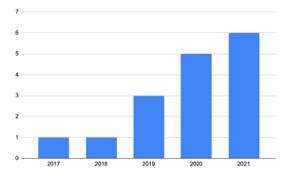
PublicationSources
Numberof Publications Author
International Journal of ProductionResearch 1 Zhong,etal[6]
JournalofCleanerProduction 1 SichaoLiu,etal [7]
IFIP Advances in Information and Communication Technology 1 Sabbagh, et al [8]
RenewableEnergy 1 Lee,etal[9] AdvancesinIntelligentSystems andComputing 1 Casado-Vara,et al[10]
Transportation 1 Halvorsen,etal [11]
LOGI - Scientific Journal on TransportandLogistics 1 Sulyova, et al [12]
Transactions on Emerging Telecommunications Technologies 1 Kumar, et al [13]
Sustainability(Switzerland) 2 Gorecki, et al [14], and Mazzarino,etal [15]
2020 3rd International Conference on Computer and InformaticsEngineering,IC2IE 2020 1 Komala, et al [16]
Production Planning and Control 1 Helo,etal[17]
Journal of Open Innovation: Technology, Market, and Complexity 1 Tripathi, et al [18]
International Journal of Logistics Research and Applications 1 Weihua Liu, et al[5]
Industrial Management and DataSystems 1 Weihua Liu, et al[19]
AutomationinConstruction 1 WeishengLu,et al[20]
Chart - 1: NumberofArticlesbyYear
3.1 Information Technology Discussion Topics (RQ 1)
Basedontheliteraturestudyconducted,thearticlesthatare thesubjectofthestudyarethengroupedbasedonthetopic of discussion of information technology contained in the article. The grouping in this paper develops the topic groupingtechniquesthathavebeencarriedoutby[3].The
Volume: 09 Issue: 12 | Dec 2022 www.irjet.net p-ISSN: 2395-0072 © 2022, IRJET | Impact Factor value: 7.529 | ISO 9001:2008 Certified Journal | Page945
International Research Journal of Engineering and Technology (IRJET) e-ISSN: 2395-0056
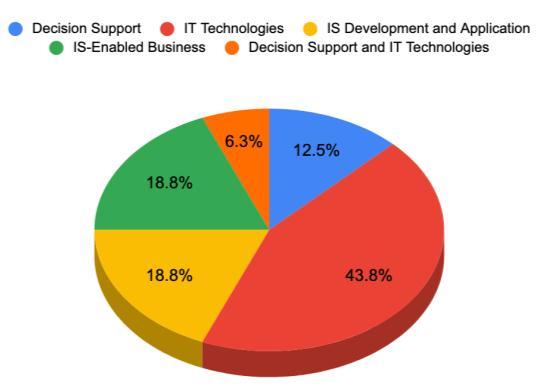
Volume: 09 Issue: 12 | Dec 2022 www.irjet.net p-ISSN: 2395-0072
selectedarticlesareknowntocoverseveraltopicsrelatedto information technology as shown in Table 5 and Chart 2 below.
Collectively,Chart2showsthatpreviousresearchexamines moreinthetechnologyregionsofITitself(43.8%)suchas IoT, GIS, Google Trend, Blockchain, and System Modelling and Simulation. There are several rationalizations that encouragesomeresearcherstodiscussthis,forexample,to support the improvement of operational management efficiency,specificallyitcanbeseeninthecontextofservice efficiencyinlogisticsnetworks[7],[9],productionfloor[6], [14], and contracting activities [10], [13]. Meanwhile, in Table5,itisshownthatthereis1articlethatexaminesthe issue of smart manufacturing using the perspective of the frameworkorindustrialmodel4.0[1].
Table - 5: CLUSTERITTopics
Cluster ITTopics[Reference]
DecisionSupport Big Data[6], Artificial Intelligence[17]
ITTechnologies InternetofThings[7],Google Trend Data[8],Geographical Information System[9], Blockchain[10], [13], [20], System Modelling and Simulation[14]
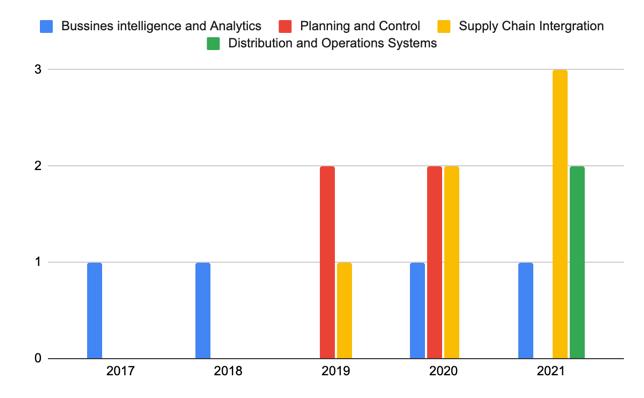
Information System (IS) Development and Application
Automatic Data Collection System[11], Smart City Concept[12],ERP[16]
Information System (IS)EnabledBusiness E-Commerce[5],SmartLeanGreen[18], Smart logistics ecologicalchain[19]
Decision Support and IT Technology SmartManufacturing[1]
throughtheapplicationofITindeterminingdecisionsboth at the strategic and tactical levels. Based on the literature studiesthathavebeencarriedout,a groupingofresearch developments in previous research related to IT and SCM wasobtained.Thegroupingwascarriedoutreferringtothe groupingofstudiesthathavebeencarriedoutbyKakhiand Gargeya [3]. As shown in Chart 3 below, there are four clustersinthispaper.Themostwidelycarriedoutresearch trendisrelatedtoSupplyChainIntegration(SCI).Basedon Chart 4 from 2017 to 2021, topics related to Business IntelligenceandAnalytics(BI&A)canbeseenthateveryyear thereisonearticleandespeciallyin2017and2018thereare onlyBI&Atopicsthatarepublished.Meanwhile,thetopicof Supply Chain Integration is seen to have increased every yearfrom2018to2021.
Chart - 2: PercentageofNumberofArticlesbyIT
ResearchrelatedtoITinthecontextofSCMhasanimpacton companiesinreducingcostsandincreasingcompetitiveness
Chart - 3: PercentageofITArticlesintheContextofSCM
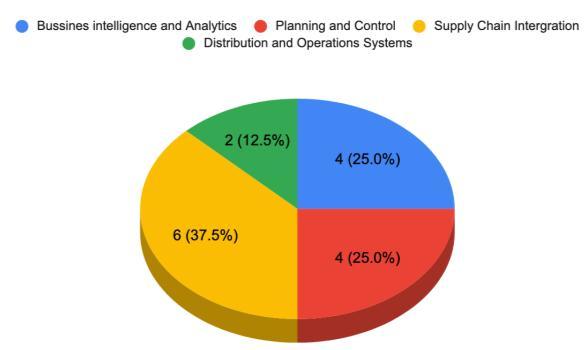
Chart - 4: NumberofArticlesClassifiedbySCMTopic
Chart5belowispresentedrelatedtotheresearchmethods usedinthecontextofIT&SCM.Thereare14differenttypes of methods used by researchers. The most widely used methodisanexploratorystudyof3articles.Basedonthe exploratorystudymethod,theresearchresultsobtainedare intheformoftheoreticalmodelsrelatedtoIT&SCMtopics, as was done by Liu, et al related to factors that affect the collaboration of a logistics organization in the context of smartlogisticsecologicalchain(SLEC)[5]
2022, IRJET | Impact Factor value: 7.529 | ISO 9001:2008 Certified Journal | Page946

International Research Journal of Engineering and Technology (IRJET) e-ISSN: 2395-0056

Volume: 09 Issue: 12 | Dec 2022 www.irjet.net p-ISSN: 2395-0072
operation,facilitatingthetransactionprocess,beingableto collectandprovidevariousrelevantandusefulinformation indecisionmaking,beingabletomonitorandsupervisethe performanceofemployeesandanorganizationalunit,and playingaroleinrecordingthestatusandchangesthatoccur inbusinessfunctions.Briefly,theroleofITfromafunctional perspectiveinsupplychainmanagementisdividedintofour, namelyasafunctionoftransactions,collaborative,decision consideration(DSS),andreporting[2]
Inpreviousstudies,agroupinghasbeencarriedoutbased on the topic of discussion of SCM as presented in Chart 6 Basedontheresultsofthereview,fourclassificationswere obtained related to the topic of discussion of SCM in the previous study which included operational management (OM),logisticsmanagement(LM),supplychainmanagement (SCM), and supplier relationship management (SRM). AccordingtoChart6,itcanbeseenthatthedominatingSCM topicsarerelatedtoLMtopicsby43.8%relatedtologistics networks[5],[7],[9],transportation[11],[12],distribution [16],andlogisticsorganizationcollaboration [19]
Ontheotherhand,theattentionofacademicshasnotbeen fullydirectedtothetopicofSRMbecauseitcanbeseenfrom the current number of articles that as many as 12.5% of previous studies have addressed the topic and the scope discussedisstilllimitedtocontractingactivitiesasKumar,et alhavedone [13],andCasado-Vara,etal[10].
Table6belowshowsamapofpreviousresearchbasedon theitrolematrixandsupplychainstageadoptedfrom[2]. BasedonTable6,thepositionofthepreviousresearchwas dominantinthedecisionsupportsystems(DSS)studyandat thesupplychainstage,namelymake.
Table - 6: PreviousResearchMatrixBasedonSupply ChainStage
Reporting [11], [14], [21] [7] DSS [9]
of IT
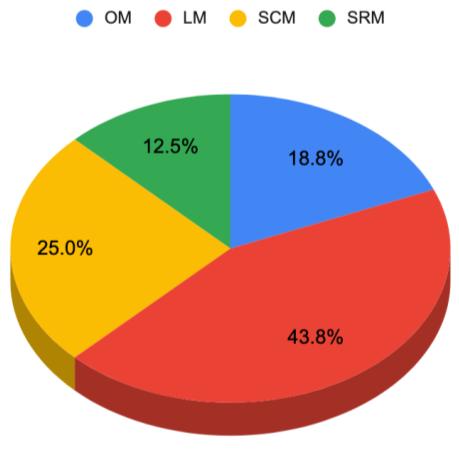
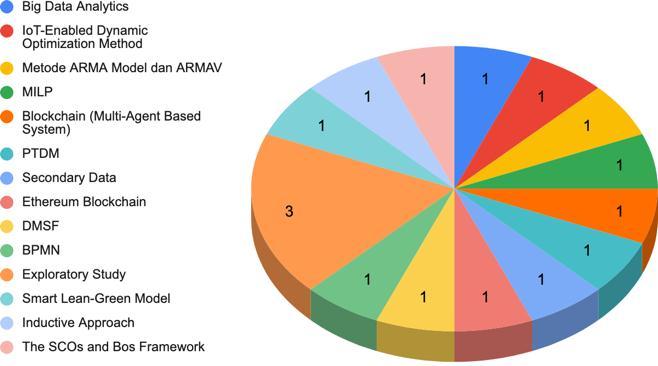
Information technology has a very important role in an organizationincludinginthecontext ofthesupplychain[2]. Someoftheimportantrolesofinformationtechnology for organizations include improving the efficiency of an
[6], [8], [11], [12], [14], [15], [17], [21], [22]
[7],[19]
Collaborative [19] [14], [16], [19] [7], [10], [19]
Transactions [7],[13]
[12], [14], [15], [17] [10],[17]
Chart 7 below shows the number of articles based on the industrysectorusedastheobjectoftheresearchcasestudy. Thereare7industrycategorieswereidentifiedinprevious research,namely,themanufacturing,logistics,publicservice, e-commerce, pharmaceutical, biogas energy, and constructionindustries.Fromthedata,itcanbeunderstood that most of it and SCM-related articles make the manufacturingindustrysectora casestudy.Inaddition, it canalsobeseenthatthereisaresearcher'sinterestintheecommercesector[5],[19]andpublicservices(smartcities)
International Research Journal of Engineering and Technology (IRJET) e-ISSN: 2395-0056

Volume: 09 Issue: 12 | Dec 2022 www.irjet.net p-ISSN: 2395-0072
[12]asa caseofITandSCM-related research.Meanwhile, other industries such as construction, logistics, biogas energy,andpharmaceuticalsarestillrelativelyfew.Onthe other hand, previous research has not touched the smallscaleindustrialsector.
attention of researchers to the use of the role of IT in integratingsupplychains.Aspresentedontheresearchmap, there is research at all levels of the supply chain, namely fromthebuy,make,andsellstages.
Thisresearchfoundthatbasedonthetopicofdiscussionin previousresearchontheissueofinformationtechnologyin thecontextofsupplychainmanagement,itisknownthatit is mostly dominated by IT technology topics such as IoT, Google Trend, GIS, Simulation systems and modeling, and Blockchain. Then, the next finding, namely the IT characteristics in supply chain integration in previous researchshowedatrendofpublicationsthatcontinuedto increasefrom2019to2021.Meanwhile,thecharacteristics ofplanningandcontrolhavedecreased,whichwasshownin 2019to2020there was 1publicationeach,whilein2021 there were no publications about IT characteristics in planningandcontrolinsupplychainmanagement.
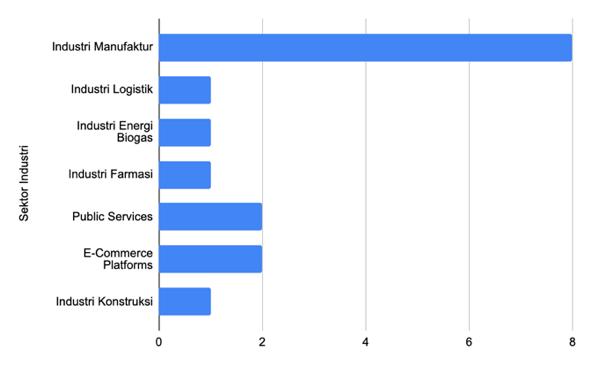
Anothercriterionstudiedinthisstudyistoidentifyprevious researchbasedontheresearchmethodused.Thefindings obtained are that the most widely used method is an exploratory study. This suggests an opportunity to use anotherapproachinproducingastudyonITinthecontext of supply chain management. Then, this study also highlighted that previous research did not pay much attentiontothestagesofthesupplychainintheupstream and downstream areas. This can be seen from the many studiesonSCMinthelogisticsmanagementarea.Infact,the studyofSRMisalsoconsideredveryimportantinthefuture.
Thisresearchalsoformulatedseveralfindingsfromselected articlesintotheformofmappingITresearchinSCM.Based onTable6above,itcanbeseenhowthepreviousresearch positionismoreinthepositionofutilizingtheroleofITin supplychainmanagementasasupportfordecisionsystems atthemadelevel, andveryfewITrolesareinvolvedatthe upstream level such as procurement activities, and relationshipswithsuppliers. However,ontheotherhand,it can also be understood that the research map shows the
Based on the findings and discussions above, the author understands that there is still a view on the current competitive climate that has reached competition at the supply chain level. So that strengthening integration and collaborationbetweenactorsinthesupplychainisbelieved to be a supplement that can encourage productivity and increase business competitiveness through IT support as decision support and collaboration between actors and stagesinthesupplychain.Ontheotherhand,thereisashift inawarenessattheconsumerlevelonsustainabilityissues. So, to respond to this, corporations must be able to reconfigurebusinessstrategiessothattheyalwaysconsider environmental, social, and economic aspects. In addition, previous research has been limited to the study of the product.PreviousresearchwasseenseekingtheuseofITin SCMtoincreasetheefficiencyofinformationflow,product flow, money flow, and business processes through IT Technologyusers.Thus,intermsofthetopicofSCM,further researchcanpayattentiontosustainabilityissuesandtheir impactonSC’sexternalenvironmentandreachsmall-scale industriesthatarenotonlylimitedtointegrationissuesbut can encourage companies to make appropriate decisions (DSS) on the products and services produced. If more specific, the next research can be directed to research on sustainableproductandserviceinnovations.
Asforrelatedtoresearchmethods,itisasidethatdepends onthegoalsandproblemsofastudyitself.However,inthe future qualitative and quantitative research is a suitable option to be applied in the context of IT and SCM. Some previous studies used methods independently; none used themethodqualitativelyandquantitatively.However,itis possiblethatthetrendsofITandSCMintheperspectiveof the methods specifically used in research are still very limited. In addition, subsequent research can fill research opportunitiesattheupstreamlevel,becauseTable6shows that previous research focused more on internal issues (make).Ontheonehand,therelationshipwithsuppliersis veryimportantinsupportingthesustainabilityofoperations to the downstream area. As for the next stage of the IT research role, it can fill the gaps at the transaction, collaborative,andreportinglevels.
ThisresearchconcludesthattheroleofITinsupplychain managementisneeded.Thisisevidentfromseveralprevious studies that present a positive contribution of IT to the achievement of supply chain management goals. Nevertheless,thisarticleisstillveryfarfromperfectionso thereneedstobeattentionfromvariouspartiestobeableto perfectthisarticleintermsofcontent,methods,andresults obtained.
Thisresearchreceived no specific grant from anyfunding agencyinthepublic,commercial,ornot-for-profitsectors.
[1] Z.M.Çınar,Q.Zeeshan,andO.Korhan,‘Aframework for industry 4.0 readiness and maturity of smart manufacturing enterprises: A case study’, Sustain., vol.13,no.12,pp.1–32,Jun.2021.
[2] J. Shah, Supply Chain Management: Text and Cases, Second. Pearson India Education Services Pvt. Ltd, 2016.
[3] M.DaneshvarKakhkiandV.B.Gargeya,‘Information systemsforsupplychainmanagement:asystematic literatureanalysis’, Int. J. Prod.Res.,vol.57,pp.5318–5339,2019.
[4] L. S. Angreani, A. Vijaya, and H. Wicaksono, ‘Systematic Literature Review of Industry 4.0 Maturity Model for Manufacturing and Logistics Sectors’, Procedia Manuf.,vol.52,pp.337–343,Jan. 2020.
[5] W. Liu, J. Zhang, S. Wei, and D. Wang, ‘Factors influencing organisational efficiency in a smartlogisticsecologicalchainundere-commerceplatform leadership’, Int. J. Logist. Res. Appl.,vol.24,no.4,pp. 1–28,2021.
[6] R.Y.Zhong,C.Xu,C.Chen,andG.Q.Huang,‘BigData Analytics for Physical Internet-based intelligent manufacturingshopfloors’, Int. J. Prod. Res.,vol.55, no.9,pp.2610–2621,2017.
[7] S.Liu,Y.Zhang,Y.Liu,L.Wang,andX.VincentWang, ‘An “Internet of Things” enabled dynamic optimizationmethodforsmartvehiclesandlogistics tasks’, J. Clean. Prod.,vol.215,no.215,pp.806–820, 2018.
[8] R.SabbaghandD.Djurdjanovic,‘DevelopingSmart Supply Chain Management Systems Using Google Trend’s Search Data: A Case Study’, IFIP Adv. Inf. Commun. Technol.,vol.567,pp.591–599,2019.
[9] M.K.Lee,H.Hashim,J.S.Lim,andM.R.Taib,‘Spatial planningandoptimisationforvirtualdistributionof BioCNGderivedfrompalmoilmilleffluenttomeet industrialenergydemand’, Renew. Energy,vol.141, pp.526–540,Oct.2019.
[10] R.Casado-Vara,A.González-Briones,J.Prieto,andJ. M. Corchado, ‘Smart Contract for Monitoring and Control of Logistics Activities: Pharmaceutical Utilities Case Study’, Adv. Intell. Syst. Comput., vol.
771,pp.509–517,2019.
[11] A.Halvorsen,H.N.Koutsopoulos,Z.Ma,andJ.Zhao, ‘Demandmanagementofcongestedpublictransport systems: a conceptual framework and application usingsmartcarddata’, Transportation (Amst).,vol. 47,no.5,pp.2337–2365,Oct.2020.
[12] D.Šulyová,J.Vodák,andG.Koman,‘Implementation smartcityconceptsformobility,casestudyofworld logisticmodelsonthesmartprinciples’, LOGI - Sci. J. Transp. Logist.,vol.11,no.2,pp.110–119,Nov.2020.
[13] A.Kumar,K.Abhishek,P.Nerurkar,M.R.Ghalib,A. Shankar, and X. Cheng, ‘Secure smart contracts for cloud-based manufacturing using Ethereum blockchain’, Trans. Emerg. Telecommun. Technol., 2020.
[14] S.Gorecki,J.Possik,G.Zacharewicz,Y.Ducq,andN. Perry,‘Amulticomponentdistributedframeworkfor smartproductionsystemmodelingandsimulation’, Sustain.,vol.12,no.17,pp.1–26,Sep.2020.
[15] M.MazzarinoandL.Rubini,‘SmartUrbanPlanning: Evaluating Urban Logistics Performance of InnovativeSolutionsandSustainablePoliciesinthe VeniceLagoon-theResultsofaCaseStudy’, Sustain., vol.11,no.17,pp.1–27,2019.
[16] G.T.KomalaandA.A.Agus,‘InformationTechnology SystemsinSupportingOutboundLogistics:Studyof Low-End Ice Cream Distribution Business in Indonesia’, 2020 3rd Int. Conf. Comput. Informatics Eng. IC2IE 2020,pp.230–235,Sep.2020.
[17] P. Helo and Y. Hao, ‘Artificial intelligence in operations management and supply chain management:anexploratorycasestudy’, Prod. Plan. Control,pp.1–18,2021.
[18] V.Tripathi et al.,‘Aninnovativeagilemodelofsmart lean–greenapproachforsustainabilityenhancement in industry 4.0’, J. Open Innov. Technol. Mark. Complex.,vol.7,no.215,pp.1–20,Dec.2021.
[19] W. Liu, Y. Liang, S. Wei, and P. Wu, ‘The organizational collaboration framework of smart logistics ecological chain: a multi-case study in China’, Ind. Manag. Data Syst., vol. 121, no. 9, pp. 2026–2047,Sep.2021.
[20] W.Lu,X.Li,F.Xue,R.Zhao,L.Wu,andA.G.O.Yeh, ‘Exploringsmartconstructionobjectsasblockchain oraclesinconstructionsupplychainmanagement’, Autom. Constr.,vol.129,Sep.2021.
[21] I. Antoniuk, R. Svitek, M. Krajcovic, and B. Furmannová, ‘Methodology of design and
International Research Journal of Engineering and Technology (IRJET) e-ISSN: 2395-0056 Volume: 09 Issue: 12 | Dec 2022 www.irjet.net p-ISSN: 2395-0072 © 2022, IRJET | Impact Factor value: 7.529 | ISO 9001:2008 Certified Journal | Page949

International Research Journal of Engineering and Technology (IRJET) e-ISSN: 2395-0056
Volume: 09 Issue: 12 | Dec 2022 www.irjet.net p-ISSN: 2395-0072
optimization of internal logistics in the concept of Industry4.0’, Transp. Res. Procedia,vol.55,pp.503–509,2021.
[22] H.H.Eldien,K.Gazzeh,andE.Hammad,‘Sustainable supply chain management in smart city design: A case study of Al Khobar City centre’, Int. J. Supply Chain Manag.,vol.9,no.4,pp.893–910,Aug.2020.
The author is a student of the Industrial engineering master's programattheFacultyofIndustrial Technology, Universitas Islam Indonesia,Yogyakarta.Interestedin supplychainmanagement.

2022, IRJET | Impact Factor value: 7.529 | ISO 9001:2008 Certified Journal | Page950
